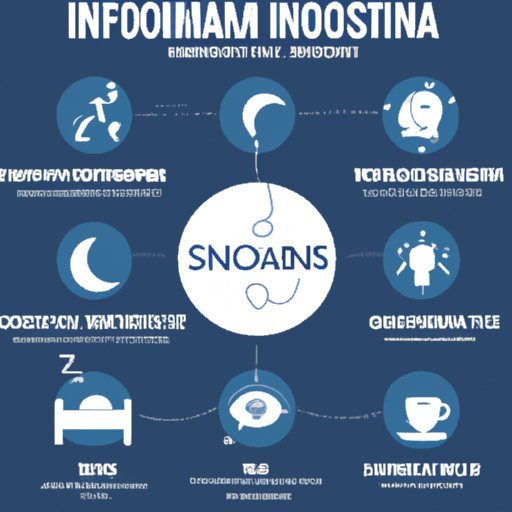
Introduction
Insomnia is a common sleep disorder that affects millions of people worldwide. It is characterized by difficulty falling asleep, staying asleep, or waking up too early. The impact of insomnia can be detrimental to one’s daily life, causing fatigue, irritability, and difficulty concentrating. In this article, we will explore how to know if you have insomnia, including symptoms, causes, and coping strategies.
Conduct a Self-Assessment Test
The first step in determining whether you have insomnia is to conduct a self-assessment test. This test is crucial in identifying the severity and frequency of insomnia. Self-evaluation can help you recognize patterns and contributing factors that may be affecting your sleep. Below is a checklist of common symptoms or behaviors consistent with insomnia:
Checklist:
- Difficulty falling asleep
- Waking up frequently during the night
- Waking up too early and not being able to fall back asleep
- Feeling tired or exhausted despite getting a full night’s rest
- Difficulty staying awake or alert during the day
- Irritability, anxiety, or depression
- Difficulty concentrating or remembering things
If you have experienced one or more of the symptoms above, it may be a sign of insomnia. It is important to note that occasional difficulty sleeping is normal; however, if it becomes a chronic issue, it may be time to seek help.
Highlight Warning Signs
In addition to the checklist above, there are other common warning signs that may indicate a person is experiencing insomnia. Some of these warning signs include:
- Tossing and turning in bed for an extended period without falling asleep
- Waking up feeling unrefreshed or exhausted
- Feeling anxious or worried at bedtime
- Using sleeping pills frequently
- Feeling sleepy or fatigued during the day
- Having difficulty completing tasks or concentrating during the day
If you are experiencing any of these warning signs, it may be time to evaluate your sleep patterns and take steps to improve your overall sleep quality.
Discuss Common Causes
Insomnia can be caused by various factors, including stress, anxiety, or certain medical conditions. Stress and anxiety can cause racing thoughts, preventing one from falling asleep or staying asleep. Medical conditions such as sleep apnea, restless leg syndrome, or chronic pain can also contribute to insomnia. Certain medications, such as antidepressants or blood pressure medications, can also disrupt sleep patterns.
Identifying the cause of insomnia can help individuals take steps towards addressing their underlying issues and improve their sleep quality.
Provide Sleep Hygiene Tips
Adopting better sleep hygiene practices can help improve overall sleep quality. A few practical tips include:
- Avoiding caffeine, nicotine, and alcohol before bed
- Creating a relaxing bedtime routine
- Making the bedroom dark, quiet, and comfortable
- Avoiding electronics before bed
- Exercising regularly during the day
- Keeping a consistent sleep schedule
By following these tips, you can create a more conducive environment for restful sleep.
Offer Coping Strategies
While sleep hygiene practices can help improve overall sleep quality, they may not be enough for individuals with chronic or severe insomnia. Coping strategies such as relaxation techniques, exercise, and cognitive behavioral therapy can help manage stress and improve sleep quality. Here are a few options:
- Deep breathing exercises
- Yoga or meditation
- Progressive muscle relaxation
- Exercise, particularly aerobic exercise
- Cognitive behavioral therapy
It is essential to experiment and find what works best for you. Coping strategies can help manage stress and improve overall sleep quality.
Encourage Seeking Professional Help
If self-evaluation and coping strategies do not improve your sleep quality, it may be time to seek professional help. Treatment options may include medication, therapy, or a combination of the two. Sleeping pills or sedatives can help individuals fall asleep faster, but they can also become habit-forming or cause drowsiness the following day. Cognitive-behavioral therapy can help manage stress and improve sleep quality through behavioural and cognitive interventions.
It is crucial to reach out for help if insomnia persists. Insomnia can have long-term effects on an individual’s overall health and well-being.
Conclusion
Insomnia is a common sleep disorder that affects millions of people worldwide. The impact of insomnia can be detrimental to one’s daily life, causing fatigue, irritability, and difficulty concentrating. Identifying the symptoms, causes, and coping strategies for insomnia can help individuals take steps towards restful sleep and improve their overall well-being. Remember to seek professional help if insomnia persists or becomes chronic.





